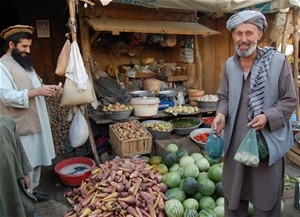
Baharak Bazaar vegetable trader Faiz Mohammad (left) has enjoyed brisk sales since the completion of USAID’s road building campaign.
USAID/ADP/N/David DeVoss
Smoother roads and decreased travel time prompt market expansion and economic growth.
31 AUGUST 2009 | BAHARAK, AFGHANISTAN
Several years ago, there were only three produce merchants in the Baharak Bazaar, a market in Afghanistan’s remote northern province of Badakhshan. Today, there are 30 traders selling fresh fruits and vegetables. Farmers are growing more diverse crops and enjoying larger harvests as they take advantage of lower transportation costs resulting from a massive USAID program to build and improve roads.
Just last year, most farmers were transporting their crops to market on rutted dirt roads. The trip from small farming villages to Baharak was long and rough, which spoiled and damaged produce to the point that it could not be sold. These unforgiving logistics reduced profits significantly, and many farmers simply didn’t take vegetables to market, preferring to trade them in a village barter economy. The vegetables that made it to market were very expensive due to the high costs of transportation.
New roads have completely changed the situation, allowing farmers to bring their produce to market in a quick and affordable manner. Today, a smoother, realigned road between Baharak and the district center of Shohada has reduced travel time by 45 minutes. The drive from the village of Shashpol to Baharak takes only 20 minutes, down from 1.5 hours. Before the Shashpol road was improved, a farmer had to pay $40 to get his crop to market in an all-terrain vehicle or endure a long, bumpy donkey ride. Now the same trip can be made in a car for $4, transporting crops safely and efficiently.
As a result, merchants in the Baharak Bazaar now sell a wide variety of grains, vegetables, nuts, and fruit. The market for walnuts and cherries is so strong that they have become export commodities – and improved roads allow farmers and merchants to sell increasing amounts of these profitable crops.
This year, Baharak merchants will send 2,000 tons of walnuts to both Kabul and overseas markets – a huge increase from the 270 tons sold to Kabul last year. “Sales are up 80 percent because of better roads,” explained Faiz Mohammad, a Baharak vegetable seller. “Now we’re real entrepreneurs, businessmen who are even starting to export.” Good roads truly make the difference between subsistence farming and economic success.







Comment
Make a general inquiry or suggest an improvement.